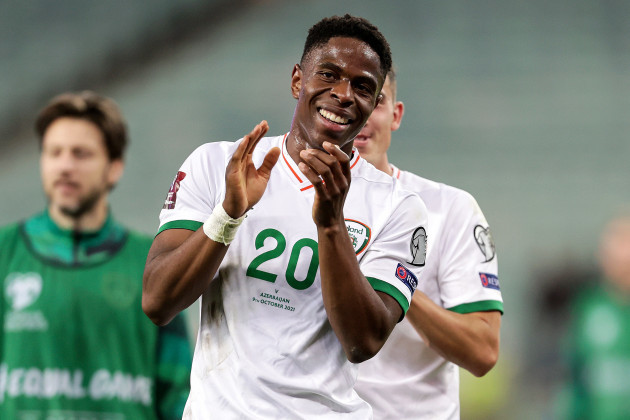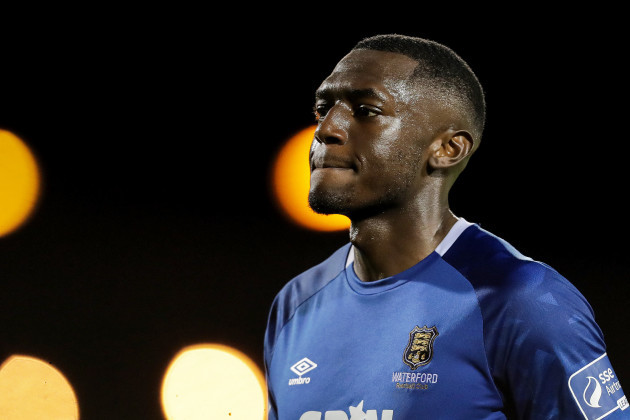IT WAS ONE of many happy subplots to Ireland’s uplifting week: Chiedozie Ogbene becoming the first African-born player to score and then start for Ireland in a senior competitive international.
“There’s so much joy going through my body right now for myself”, Ogbene beamed after scoring his first goal in Baku a week ago.
His smile was beatific, as it was days earlier as he told us of his story. Chiedozie was born in Nigeria and when he was seven, his father had a job opportunity and moved the family to Cork for a better life.
“I guess it was the best decision that he made for his family, and I’m reaping the rewards for being here.” Stephen Kenny made Ogbene’s eligibility for Ireland a priority, and set it in motion on his second day in the job.
“There was a long process to get him registered to play for us”, said Kenny. “The process was with Uefa and Fifa, and having to trawl through records, which I didn’t feel was right. He was living in Cork since he was seven.”
It took 14 months and reams of paperwork to satisfy Fifa’s requests. Ogbene submitted school records from primary school and secondary school, a chronology of the family’s time in Ireland, a proof of address, proof of his parents’ jobs, and character references from teachers and the local community.
All had to be done to comply with Fifa’s shifting eligibility rules. Under the latest guidelines, the FAI and Ogbene had to show that he had lived here for three years before the age of 10, and also prove he did not move here solely so Ogbene would become a professional footballer.
These rules were drawn in response to several high-profile instances of countries drafting in young promising young footballers from abroad and instantly granting them citizenship.
Fifa introduced emergency measures in 2003, when it became apparent that Qatar – then managed by Philippe Troussier – granted nationality to three Brazilian footballers - Ailton, Dede and Leandro – solely to represent the national football team.
The governing body decided that players must have a link with the country they wished to represent, and decreed that a player must have either lived in that country for two years or have a parent or grandparent hailing from there. Otherwise, the player must earn the nation’s citizenship and reside there for five years after they turn the age of 18.
This was adapted over time, and a three-year residency prior to the age of 10 was deemed acceptable. These are worthy rules, but they have had unintended consequences.
While Fifa eventually and rightly gave Ogbene his chance to play for Ireland, not everyone has had the same chance.
*****
Maxim Kouogun moved to Ireland when he was five months old, holds Irish citizenship, but he has yet to be deemed eligible to play football for Ireland.
Kouogun was born in Cameroon but was all of five months old when his parents moved to Ireland, initially to Celbridge and then to Leixlip. “They came here for a better life”, says Kouogun, “a better standard of life and future for myself and my siblings.”
Growing up he showed promise as a footballer from his early days with Peamount, from where he joined Leixlip United and then Cherry Orchard, where he was coached by David Collins, a player once of Liverpool’s academy and father of Ireland’s latest senior international, Nathan.
“Davy was a huge part of my development”, says Kouogun. “Not only as a player but as a person, too. He was instrumental in my schoolboy years. I lost my Dad when I was 10, and David Collins was really a father-figure for me at that time.
“He made me fall in love with football, he held my hand throughout schoolboy football, and he understood my mum was supportive but didn’t have a huge knowledge of football.”
It was while at Cherry Orchard that Kouogun came to the attention of Tom Mohan, then the Irish U17s manager.
By this point Kouogun had Irish citizenship – granted when his mother was granted hers – and was selected in the squad for a double-header of European qualifiers in Armenia.
“The squad was announced on the Monday or Tuesday and we were due to travel on the Saturday”, he remembers. “Then, on Wednesday evening, Tom Mohan gave me a call to ask if I was born in Ireland. I told him ‘No, but I have my citizenship.’ He said, ‘No problem, I am going to ring you tomorrow to clarify a few things.’
“I was completely in the dark and didn’t know what was happening. The following day – I don’t mean to sound bad or anything – but I was excited and went and bought new football boots for my trip. My mum picked me up from Liffey Valley with my new boots but while I was at school she had taken a call from Tom Mohan to say I couldn’t travel because of eligibility issues.
“I hadn’t a clue. I was under the impression I was Irish. I came here when I was five months old, I had my Irish citizenship as I had been in the country for so long and had gone through the schooling system. I was Irish. My mum was Irish, my siblings were Irish. Myself and my mum had Irish citizenship, my two younger siblings were born here. I was completely unaware that there would be any doubt about my eligibility.”
Mohan could play Kouogun in friendly matches – he excelled in one appearance against Latvia – but couldn’t play him in competitive matches, and thus began the long process to prove to Fifa he was eligible to play for Ireland.
“I was told by the FAI that Fifa required school transcripts, proof of attendance through all of primary school and proof of attendance through all of secondary school. I remember I had to submit a proof of address of where I was living, and I remember going into Garda station and having to request a letter from them as well.”
Meanwhile, the years ticked by. He got a scholarship to UCD, playing there while getting degrees at undergraduate and masters level. While he had opportunities at club level, nothing was moving at international level.
Having missed his chance with the U17s, Paul Doolin tried to cap him with the U19s, but that chance slipped by too. Same story when it came to Noel King with the U21s.
“I was in and out of the FAI, submitting paperwork, from school transcripts to garda letters proving my proof of address since I was in the country, school reports. Everything. And it never manifested into success.
“Anytime they came back requesting a document, I provided it, but it never seemed to manifest in success.”
Kouogun’s club career continued apace. He left UCD for Waterford, from where he earned an opportunity with Harrowgate in England that was cut short last year at the onset of the pandemic. He decided to return to Ireland, and has been part of Shelbourne’s promotion-winning squad this year.
Now 24, the window to represent Ireland at underage level has long been closed: the process has fizzled out and he has never been given a precise explanation as to why he it has not worked out. The FAI are also in the dark over it all, while Fifa did not respond to The42‘s request to explain the situation.
“My understanding of it was Qatar had brought over Brazilian kids and given them Qatari citizenship and claimed they were from Qatar and wanted them to play for the national team”, says Kouogun.
“Since then Fifa had clamped down on ‘foreign’ players coming into particular nations and being given citizenship, and when they were declaring for the national team it was an issue. I understood the logic of what Fifa were trying to do, but in my case, I don’t think there was much chance of them predicting I would grow up to even have an interest in football, at five months old.
“To me it seems an extremely inefficient system Fifa have going on. I have been denied the opportunity to represent the country I feel I belong to. It’s sad. The fact you know the coaching staff of all these teams are being impressed by the work you are putting in, and then not being able to reap the rewards of that work…it’s sad to be honest.
“It was my first heartbreak in football.”


